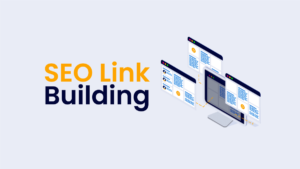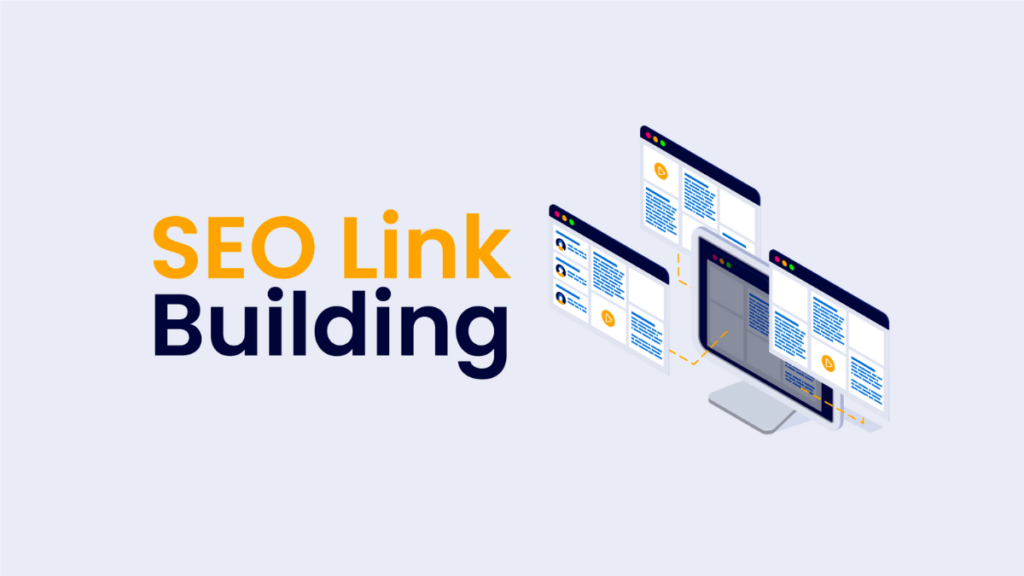Link Building SEO: Link building is a crucial aspect of search engine optimization (SEO) that involves acquiring links from external websites to your own. The more quality links pointing to your site, the higher its authority and visibility in search engines like Google. In essence, link-building signals tell search engines that your content is valuable, relevant, and trustworthy.

| Link Type | Description | Impact on SEO |
| Internal Links | Links that point to other pages within the same website. |
Helps search engines understand site structure and improves user navigation.
|
| External Links (Backlinks) | Links from other websites pointing to your site. |
Boosts website authority and helps improve search engine rankings.
|
| Nofollow Links | Links with a “rel=nofollow” attribute that don’t pass SEO value. |
Does not impact rankings but can drive traffic.
|
| Dofollow Links | Links that pass SEO value and help improve rankings. |
Directly contributes to improving search engine rankings.
|
Types of Links in SEO
Understanding the types of links in SEO is essential for effective link building.
- Internal Links: These are links that point to other pages within your website. Internal linking helps search engines understand your site structure and helps users navigate your content more easily.
- External Links (Backlinks): Backlinks are links from external websites to your site. They are vital for SEO as they signal authority and relevance to search engines.
- Nofollow vs. Dofollow Links: A dofollow link passes SEO value, helping your site rank higher. A nofollow link, on the other hand, does not pass SEO value, but it still can drive traffic to your site.
Why Link Building is Crucial for SEO
Link building plays a significant role in SEO for several reasons:
- Authority Building: When reputable sites link to your content, search engines perceive your website as more authoritative and relevant, which boosts your rankings.
- Increasing Organic Traffic: High-quality backlinks from popular sites lead to increased visibility, thus driving organic traffic to your website.
- Content Visibility: Backlinks help your content reach a wider audience. The more external websites that link to your content, the higher the chance of ranking for related search queries.
- Building Trust with Search Engines: Search engines trust websites that receive numerous quality backlinks, making them more likely to rank well.
Effective Link-Building Strategies
Successful link-building requires a thoughtful approach. Here are some effective strategies:
- Content Marketing: Create valuable, informative, and engaging content that naturally attracts backlinks. Infographics, case studies, and well-researched blog posts are great examples of content that often generates backlinks.
- Guest Blogging: Writing guest posts on reputable websites allows you to showcase your expertise while earning backlinks. Focus on high-quality websites in your industry for maximum impact.
- Broken Link Building: Find broken links on other websites and offer your content as a replacement. This strategy provides value to website owners while earning backlinks.
- Influencer Outreach: Collaborating with influencers in your industry can help you acquire high-quality backlinks and improve your brand’s visibility.
- Competitor Analysis: analyze your competitors’ backlink profiles to identify new link-building opportunities. Tools like Ahrefs and SEMrush can help you discover where your competitors are getting their backlinks.
Tools for Link Building SEO
Several tools can help you identify link-building opportunities and measure their effectiveness:
| Tool | Description | Link |
| Ahrefs | Comprehensive tool for backlink analysis and competitor research. | Ahrefs |
| SEMrush | Powerful tool for SEO analysis, including backlink tracking. | SEMrush |
| Moz Link Explorer | Helps track and analyze backlinks and SEO performance. |
Moz Link Explorer
|
| Google Search Console | Provides insights on backlinks and overall site performance. |
- Ahrefs: A comprehensive SEO tool that helps you find backlinks, analyze competitor strategies, and track link performance.
- SEMrush: A tool for competitor analysis, backlink tracking, and keyword research.
- Moz Link Explorer: Helps you track the quality and quantity of backlinks pointing to your site.
- Google Search Console: provides insights into your backlinks and allows you to monitor their performance.
Common Link-Building Mistakes to Avoid
To maximize the benefits of link building, avoid these common mistakes:
- Using Low-Quality Links: Focus on acquiring high-quality, relevant links. Links from spammy or irrelevant sites can harm your SEO.
- Over-Optimizing Anchor Text: Don’t stuff anchor text with keywords. Use natural and varied anchor text to maintain a natural link profile.
- Ignoring Link Relevance: Ensure that the websites linking to your content are relevant to your niche. Irrelevant links can harm your credibility.
- Buying Backlinks: Avoid buying backlinks, as it can lead to penalties from search engines and damage your site’s reputation.
Measuring Link Building Success
To assess the success of your link-building efforts, track the following metrics:
- Domain Authority (DA): Measures the overall authority of your website based on its backlink profile. A higher DA typically leads to better search engine rankings.
- Page Authority (PA): Similar to DA, PA measures the authority of individual pages on your site.
- Referral Traffic: Monitor the traffic driven by backlinks using Google Analytics.
- Backlink Profile: Regularly analyze your backlink profile to ensure it remains healthy and diverse.
Core Concepts of Link Building
- Link Quality:
- Domain Authority (DA) and Page Authority (PA): These metrics, provided by tools like Moz, measure the overall strength and relevance of a website and its pages. Linking from high-authority websites can significantly boost your own site’s visibility.
- Relevance of the Linking Page: Backlinks from websites that are thematically related to your content are more valuable.
- Anchor Text Diversity: The text used to describe a hyperlink is known as anchor text. A diverse range of anchor texts, including branded, generic, and keyword-rich anchors, can enhance your SEO efforts.
- Link Quantity:
- The Ideal Number of Backlinks: While quantity matters, quality is paramount. A few high-quality backlinks are more beneficial than many low-quality ones.
- The Importance of Natural Link Growth: Organic link growth, where backlinks are earned naturally through content sharing and promotion, is a sign of a healthy website.
- Link Profile Diversity:
- The Importance of a Diverse Backlink Profile: A diverse backlink profile, comprising links from various sources like guest posts, directory submissions, and social media, can help you avoid penalties from search engines.
- Balancing Different Types of Links: A well-rounded link profile includes a mix of different link types to maintain a natural look.
Link Building Strategies
-
-
- White-Hat Link Building Tactics: Content Marketing: Creating High-Quality, Shareable Content: Develop informative, engaging, and visually appealing content that encourages natural sharing and linking.
- Promoting Content on Social Media and Other Channels: leverage social media platforms to amplify your content’s reach and attract backlinks.
- Guest Posting: Writing guest posts for authoritative websites: Contribute high-quality articles to reputable websites in your niche.
- Building Relationships with Other Bloggers and Website Owners: Network with other industry professionals to foster mutually beneficial relationships.
- Broken Link Building: Finding Broken Links on Other Websites: Use tools to identify broken links on other websites.
- Offering to Replace Broken Links with Your Content: Contact website owners and propose relevant content to replace the broken links, earning a valuable backlink in the process.
- Email Outreach:Reaching Out to Other Website Owners to Request Backlinks: Craft personalized emails to relevant websites, highlighting the value your content can offer.
- Social Media Marketing:Sharing Your Content on Social Media: Use social media platforms to promote your content and encourage sharing.
- Engaging with Other Users and Building Relationships: Interact with other users in your niche to build brand awareness and potential backlink opportunities.
-
Measuring Link Building Success
-
- Key Metrics:Number of Backlinks: Track the total number of backlinks pointing to your website.
- Referring Domains: Monitor the number of unique websites linking to your site.
- Domain Authority (DA) and Page Authority (PA): Measure the overall authority and relevance of your website and its pages.
- Organic Traffic: Analyze the amount of organic traffic driven by search engines.
- Rankings: Track your website’s rankings for target keywords.
Best Practices for Link Building
- Consistency: Implement a consistent link-building strategy to achieve sustainable results.
- Patience: Understand that link building is a long-term process, and results may take time.
- Ethical Practices: Adhere to ethical guidelines and avoid black-hat tactics to maintain a positive reputation.
- Adaptability: Stay updated on the latest SEO trends and adjust your strategies accordingly.
- Data-Driven Approach: Track your link-building efforts and analyze the results to make informed decisions.
Conclusion
Link building is a critical SEO strategy that can significantly improve your website’s visibility and search engine rankings. By focusing on quality, relevance, and sustainable link-building practices, you can enhance your site’s authority and drive organic traffic. Remember to use effective strategies, avoid common mistakes, and track your progress to ensure long-term SEO success.

